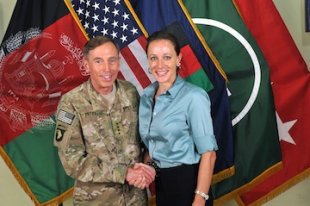Paula Broadwell, the author who allegedly had an affair with former CIA
Director David Petraeus, is suspected of storing significant amounts of
military documents, including classified material, at her home,
potentially in violation of federal law.
A source familiar with case told ABC News that Broadwell admitted to the
FBI she took the documents from secure government buildings. The
government demanded that they all be given back, and when federal agents
descended on her North Carolina home on Monday night it was a
pre-arranged meeting.
Prosecutors are now determining whether to charge Broadwell with a
crime, and this morning the FBI and military are poring over the
material. The 40-year-old author, who wrote the biography on Gen.
Petraeus "All In," is cooperating and the case, which is complicated by
the fact that as an intelligence officer in the U.S. Military Reserve
she had security clearance to review the documents.
FULL COVERAGE: David Petraeus Scandal
The FBI found classified material on a computer voluntarily handed over
by Broadwell earlier in the investigation. Prosecutors will now have to
determine how important the classified material is before making a final
decision. Authorities could decide to seek disciplinary action against
her rather than pursue charges.
Senior FBI officials are expected to brief the House and Senate
Intelligence Committees today on their handling of the Petraeus
investigation. The officials are expected to lay out how the case was
developed and argue that there were no politics involved.
The case is so critical that FBI Director Robert Mueller may attend to
defend the bureau, ABC News has learned. Members of Congress have been
angry that they were not informed about the case before the story was
reported by the media, but FBI officials maintain that their guidelines
forbid them from discussing ongoing criminal cases.
This summer, Florida socialite and "honorary ambassador" to the military Jill Kelley
received anonymous emails accusing her of flaunting a friendly
relationship with military brass in Tampa. Kelley then called the FBI,
which traced those emails back to Broadwell's computer. Investigators
are said to have then found emails in Broadwell's inbox that pointed to
an intimate affair with Petraeus, who on Friday admitted to the affair
and announced his resignation as CIA director.
See the timeline of the Petraeus/Broadwell affair HERE.
The FBI has now uncovered "potentially inappropriate" emails between
Gen. John Allen, the commander of American forces in Afghanistan, and
Kelley, according to a senior U.S. defense official who is traveling with
Defense Secretary Leon Panetta. The department is reviewing between
20,000 and 30,000 documents connected to this matter, the official said.
The email exchanges between Kelley and Allen took place from 2010 to
2012.
The U.S. official said the emails were "innocuous" and mostly about
upcoming dinner parties and seeing him on TV. Allen denies he was
involved in an affair, a Pentagon official said. An intermediary for
Allen told ABC News that Allen and his wife are friends with Kelley and
her husband and most of the emails were sent from Kelley to Allen's
wife.
A U.S. official said Allen may have triggered the investigation when he
got an anonymous email a few months ago that was traced to Broadwell.
The email had a "Kelley Patrol" return address or subject line and
painted Kelley as a seductress, which Allen found alarming and mentioned
to Kelley in a subsequent email, the official said.
The official described Kelley as a "nice, bored rich socialite who drops
the honorary from her title... and tells people she is an ambassador.
She gets herself in anything related to Centcom and all the senior
people and has been for years."
MORE: Jill Kelley and Twin Closely Tied to Top Brass
Leon Panetta: 'No One Should Leap to Any Conclusions' Regarding Gen. Allen
Panetta cautioned that "no one should leap to any conclusions" about allegations against Allen over the investigation.
Panetta said he supports Allen, who has been in command in Kabul since
July 2011. He took over that summer for Petraeus, who retired from the
Army to take over as the head of the CIA.
"He certainly has my continued confidence to lead our forces and to
continue the fight," Panetta said at a news conference in Perth,
Australia, Wednesday.
Panetta declined to explain the nature of Allen's correspondence with
Kelley, connected to the scandal that led to Petraeus' resignation last
week as director of the CIA.
Secretary of State Hillary Rodham Clinton, who appeared with Panetta,
declined to comment on the Allen case, but insured the scandal has not
harmed the war effort.
"There has been a lot of conversation, as you might expect, but no
concern whatsoever being expressed to us because the mission has been
set forth and it's being carried out," Clinton said.
Allen had been nominated as the next commander of U.S. European Command
and the commander of NATO forces in Europe, and despite President
Obama's backing, the nomination has been put on hold. The change of
command at NATO is currently slated to not take place until March at the
earliest.
Allen was supposed to appear before a Senate confirmation hearing this
Thursday alongside his designated replacement, Marine Gen. Joseph
Dunford. Panetta said that while the matter is being investigated by
the Defense Department IG, Allen will remain in his post as commander of
the International Security Assistance Force, based in Kabul.











